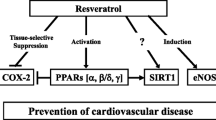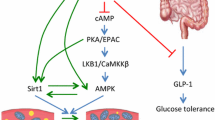Abstract
Resveratrol is a polyphenolic compound found in red wine that is believed to be responsible for its beneficial cardiovascular effects. Extensive research in the past several decades has identified multiple mechanisms by which resveratrol modifies the cardiovascular risk factors that lead to coronary artery disease, yet translation to the clinical arena has been unexpectedly slow. In this article, we review the existing evidence regarding the beneficial effects of resveratrol and briefly discuss its potential therapeutic applications.

Similar content being viewed by others
References
Papers of particular interest, published recently, have been highlighted as: • Of importance •• Of major importance
• Roger VL, Go AS, Lloyd-Jones DM, et al. Heart disease and stroke statistics—2011 update: a report from the American Heart Association. Circulation 2011;123(4):e18–209. This article details the most recent national statistics for coronary artery disease and other cardiovascular diseases.
Minino AM, Xu J, Kochanek KD, et al. Death in the United States, 2007. NCHS Data Brief. 2009;26:1–8.
Petrovski G, Gurusamy N, Das DK. Resveratrol in cardiovascular health and disease. Ann N Y Acad Sci. 2011;125:22–33.
Renaud S, de Lorgeril M. Wine, alcohol, platelets, and the French paradox for coronary heart disease. Lancet. 1992;339(8808):1523–6. This is the seminal work describing the statistics behind the French paradox.
Gaziano JM, Buring JE, Breslow JL, et al. Moderate alcohol intake, increased levels of high-density lipoprotein and its subfractions, and decreased risk of myocardial infarction. N Engl J Med. 1993;329(25):1829–34.
Jackson R, Scragg R, Beaglehole R. Alcohol consumption and risk of coronary heart disease. BMJ. 1991;303(6796):211–6.
Gronbaek M, Becker U, Johansen D, et al. Type of alcohol consumed and mortality from all causes, coronary heart disease, and cancer. Ann Intern Med. 2000;133(6):411–9.
Wannamethee SG, Shaper AG. Type of alcoholic drink and risk of major coronary heart disease events and all-cause mortality. Am J Public Health. 1999;89(5):685–90.
Lazarus NB, Kaplan GA, Cohen RD, et al. Change in alcohol consumption and risk of death from all causes and from ischaemic heart disease. BMJ. 1991;303(6802):553–6.
Colditz GA, Branch LG, Lipnick RJ, et al. Moderate alcohol and decreased cardiovascular mortality in an elderly cohort. Am Heart J. 1985;109(4):886–9.
Friedman LA, Kimball AW. Coronary heart disease mortality and alcohol consumption in Framingham. Am J Epidemiol. 1986;124(3):481–9.
Saremi A, Arora R. The cardiovascular implications of alcohol and red wine. Am J Ther. 2008;15(3):265–77.
Berliner JA, Navab M, Fogelman AM, et al. Atherosclerosis: basic mechanisms. Oxidation, inflammation, and genetics. Circulation. 1995;91(9):2488–96.
•• Do GM, Kwon EY, Kim HJ, et al. Long-term effects of resveratrol supplementation on suppression of atherogenic lesion formation and cholesterol synthesis in apo E-deficient mice. Biochem Biophys Res Commun. 2008;374(1):55–9. This work elegantly summarized the effects of resveratrol on serum cholesterol and its components, and relates those effects to pathologic findings.
Rocha KK, Souza GA, Ebaid GX, et al. Resveratrol toxicity: effects on risk factors for atherosclerosis and hepatic oxidative stress in standard and high-fat diets. Food Chem Toxicol. 2009;47(6):1362–7.
•• Robich M, Osipov R, Nezafat R, et al. Resveratrol improves myocardial perfusion in a swine model of hypercholesterolemia and chronic myocardial ischemia. Circulation 2010;122(11 Suppl):S142–9. This is the only work to date investigating the effects of resveratrol supplementation on angiogenesis and myocardial perfusion in the setting of ongoing myocardial ischemia.
• Cho IJ, Ahn JY, Kim S, et al. Resveratrol attenuates the expression of HMG-CoA reductase mRNA in hamsters. Biochem Biophys Res Commun. 2008;367(1):190–4. This article suggests a possible mechanism for many of the beneficial effects of resveratrol.
Wang Z, Zou J, Cao K, et al. Dealcoholized red wine containing known amounts of resveratrol suppresses atherosclerosis in hypercholesterolemic rabbits without affecting plasma lipid levels. Int J Mol Med. 2005;16(4):533–40.
Wilson T, Knight TJ, Beitz DC, et al. Resveratrol promotes atherosclerosis in hypercholesterolemic rabbits. Life Sci. 1996;59(1):PL 15–21.
Lusis AJ. Atherosclerosis. Nature. 2000;407(6801):233–41.
Shih DM, Xia YR, Wang XP, et al. Combined serum paraoxonase knockout/apolipoprotein E knockout mice exhibit increased lipoprotein oxidation and atherosclerosis. J Biol Chem. 2000;275(23):17527–35.
Sviridov D, Nestel P. Dynamics of reverse cholesterol transport: protection against atherosclerosis. Atherosclerosis. 2002;161(2):245–54.
Berrougui H, Grenier G, Loued S, et al. A new insight into resveratrol as an atheroprotective compound: inhibition of lipid peroxidation and enhancement of cholesterol efflux. Atherosclerosis. 2009;207(2):420–7.
Li Y, Cao Z, Zhu H. Upregulation of endogenous antioxidants and phase 2 enzymes by the red wine polyphenol, resveratrol in cultured aortic smooth muscle cells leads to cytoprotection against oxidative and electrophilic stress. Pharmacol Res. 2006;53(1):6–15.
• Deng YH, Alex D, Huang HQ, et al. Inhibition of TNF-α-mediated endothelial cell-monocyte cell adhesion and adhesion molecules expression by the resveratrol derivative, trans-3,5,4′-trimethoxystilbene. Phytother Res. 2011;25(3):451–7. This is an elegant study showing the effects of resveratrol on monocyte recruitment and activation.
Zhong M, Cheng GF, Wang WJ, et al. Inhibitory effect of resveratrol on interleukin 6 release by stimulated peritoneal macrophages of mice. Phytomedicine. 1999;6(2):79–84.
Chung EY, Kim BH, Hong JT, et al. Resveratrol down-regulates interferon-γ-inducible inflammatory genes in macrophages: molecular mechanism via decreased STAT-1 activation. J Nutr Biochem. 2010(Epub ahead of print).
Park DW, Baek K, Kim JR, et al. Resveratrol inhibits foam cell formation via NADPH oxidase 1-mediated reactive oxygen species and monocyte chemotactic protein-1. Exp Mol Med. 2009;41(3):171–9.
Venkatesan B, Valente AJ, Reddy VS, et al. Resveratrol blocks interleukin-18-EMMPRIN cross-regulation and smooth muscle cell migration. Am J Physiol Heart Circ Physiol. 2009;297(2):H874–86.
Ekshyyan VP, Hebert VY, Khandelwal A, et al. Resveratrol inhibits rat aortic vascular smooth muscle cell proliferation via estrogen receptor dependent nitric oxide production. J Cardiovasc Pharmacol. 2007;50(1):83–93.
Mizutani K, Ikeda K, Yamori Y. Resveratrol inhibits AGEs-induced proliferation and collagen synthesis activity in vascular smooth muscle cells from stroke-prone spontaneously hypertensive rats. Biochem Biophys Res Commun. 2000;274(1):61–7.
Li L, Gao P, Zhang H, et al. SIRT1 inhibits angiotensin II-induced vascular smooth muscle cell hypertrophy. Acta Biochim Biophys Sin (Shanghai). 2011;43(2):103–9.
Schroecksnadel K, Winkler C, Wirleitner B, et al. Anti-inflammatory compound resveratrol suppresses homocysteine formation in stimulated human peripheral blood mononuclear cells in vitro. Clin Chem Lab Med. 2005;43(10):1084–8.
Olas B, Wachowicz B, Saluk-Juszczak J, et al. Effect of resveratrol, a natural polyphenolic compound, on platelet activation induced by endotoxin or thrombin. Thromb Res. 2002;107(3–4):141–5.
Yang Y, Wang X, Zhang L, et al. Inhibitory effects of resveratrol on platelet activation inducded by thromboxane a(2) receptor agonist in human platelets. Am J Chin Med. 2011;39(1):145–59.
• Lin KH, Hsiao G, Shih CM, et al. Mechanisms of resveratrol-induced platelet apoptosis. Cardiovasc Res. 2009;83(3):575–85. This article reports an unexpected and interesting effect of resveratrol on platelets.
Boodhwani M, Sodha NR, Mieno S, et al. Functional, cellular, and molecular characterization of the angiogenic response to chronic myocardial ischemia in diabetes. Circulation. 2007;116(11 Suppl):I31–7.
Gnoni GV, Paglialonga G. Resveratrol inhibits fatty acid and triacylglycerol synthesis in rat hepatocytes. Eur J Clin Invest. 2009;39(3):211–8.
•• Kim S, Jin Y, Choi Y, et al. Resveratrol exerts anti-obesity effects via mechanisms involving down-regulation of adipogenic and inflammatory processes in mice. Biochem Pharmacol. 2011;81(11):1343–51. This study details several possible molecular mechanisms for the anti-obesity effects of resveratrol.
Dal-Pan A, Blanc S, Aujard F. Resveratrol suppresses body mass gain in a seasonal non-human primate model of obesity. BMC Physiol. 2010;10:11.
•• Fullerton HJ and Steinberg GR. SIRT1 takes a backseat to AMPK in the regulation of insulin sensitivity by resveratrol. Diabetes 2010;59(3):551–3. This is a good review of the actions of AMPK and how they may be responsible for the beneficial effects of resveratrol.
Franco OH, Peeters A, Bonneux L, et al. Blood pressure in adulthood and life expectancy with cardiovascular disease in men and women: life course analysis. Hypertension. 2005;46(2):280–6.
Rivera L, Moron R, Zarzuelo A, et al. Long-term resveratrol administration reduces metabolic disturbances and lowers blood pressure in obese Zucker rats. Biochem Pharmacol. 2009;77(6):1053–63.
Behbahani J, Thandapilly SJ, Louis XL, et al. Resveratrol and small artery compliance and remodeling in the spontaneously hypertensive rat. Am J Hypertens. 2010;23(12):1273–8.
•• Mukhopadhyay P, Mukherjee S, Ahsan K, et al. Restoration of altered microRNA expression in the ischemic heart with resveratrol. PLoS One. 2010;5(12):e15705. This is one of the few studies examining the protective effects of resveratrol against ischemia-reperfusion injury, and it reports a unique mechanism for these effects.
Hung LM, Su MJ, Chen JK. Resveratrol protects myocardial ischemia-reperfusion injury through both NO-dependent and NO-independent mechanisms. Free Radic Biol Med. 2004;36(6):774–81.
Robich MP, Osipov RM, Chu LM, et al. Resveratrol modifies risk factors for coronary artery disease in swine with metabolic syndrome and myocardial ischemia. Eur J Pharmacol. 2011;664:45–53.
•• Patel KR, Scott E, Brown VA, et al. Clinical trials of resveratrol. Ann N Y Acad Sci. 2011(1214):161–9. This is a concise and comprehensive review of the registered clinical trials of resveratrol that have been completed to date.
Brown VA, Patel KR, Viskaduraki M, et al. Repeat dose study of the cancer chemopreventive agent resveratrol in healthy volunteers: safety, pharmacokinetics, and effect on the insulin-like growth factor axis. Cancer Res. 2010;70(22):9003–11.
Kennedy DO, Wightman EL, Reay JL, et al. Effects of resveratrol on cerebral blood flow variables and cognitive performance in humans: a double-blind, placebo-controlled, crossover investigation. Am J Clin Nutr. 2010;91(6):1590–7.
Disclosure
L.M. Chu: none; A.D. Lassaletta: none; M.P. Robich: none; F.W. Sellke: consultant for NovoNordisk and Cubist Pharmaceuticals, expert testimony for Pfizer in litigation regarding Celebrex.
Author information
Authors and Affiliations
Corresponding author
Additional information
An erratum to this article can be found at http://dx.doi.org/10.1007/s11883-011-0213-0
Rights and permissions
About this article
Cite this article
Chu, L.M., Lassaletta, A.D., Robich, M.P. et al. Resveratrol in the Prevention and Treatment of Coronary Artery Disease. Curr Atheroscler Rep 13, 439–446 (2011). https://doi.org/10.1007/s11883-011-0202-3
Published:
Issue Date:
DOI: https://doi.org/10.1007/s11883-011-0202-3




